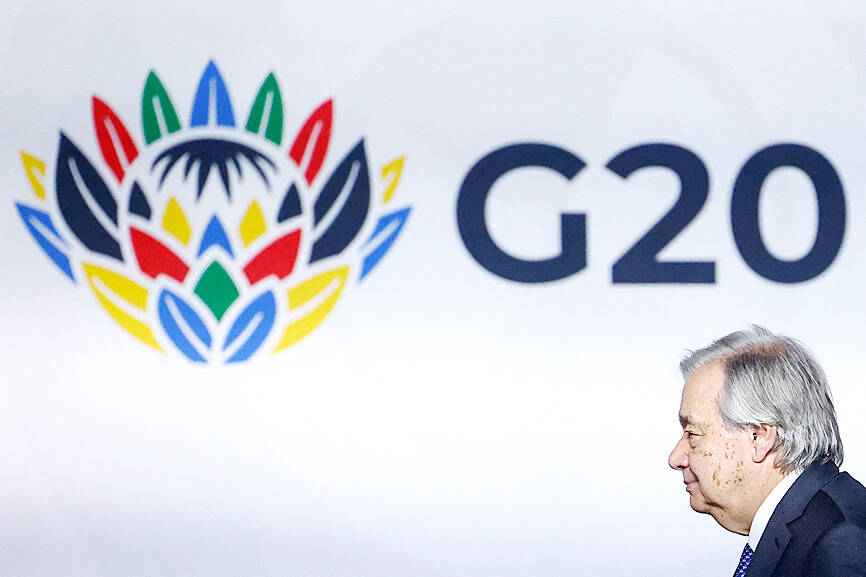The first G20 summit to be held in Africa opened yesterday with an ambitious agenda to make progress on solving some of the long-standing problems that have afflicted the world’s poorest nations.
Leaders and top government officials from the richest and leading emerging economies came together at an exhibition center near Soweto in South Africa — once home to Nelson Mandela — to try and find some consensus on the priorities set out by the host country.
They include more help for poor countries to recover from climate-related disasters, reduce their foreign debt burdens, transition to green energy sources and harness their own critical mineral wealth — all in an attempt to counter widening global inequality.

Photo: REUTERS
“We’ll see,” UN Secretary-General Antonio Guterres said on if the G20 could prioritize developing world countries and make meaningful reforms. “But I think South Africa has done its part in putting those things clearly upon the table.”
The two-day summit takes place without the world’s biggest economy after US President Donald Trump ordered a US boycott of the summit over his claims that South Africa is pursuing racist anti-white policies and persecuting its white Afrikaner minority.
A months-long diplomatic rift between the US and South Africa deepened in the buildup, but while Trump’s boycott dominated the pre-talks talk in Johannesburg and threatened to undercut the agenda, some of the leaders were eager to move on.
“I do regret it,” French President Emmanuel Macron said of Trump’s absence. “But it should not block us. Our duty is to be present, engage and work all together because we have so many challenges.”
The G20 is a group of 21 members that includes 19 nations, the EU and the African Union.
The bloc was formed in 1999 as a bridge between rich and poor nations to confront global financial crises.
While it often operates in the shadow of the G7 made up of the richest democracies, G20 members together represent about 85 percent of the world’s economy, 75 percent of international trade and more than half the global population.
However, it works on consensus rather than any binding resolutions, and that is often hard to come by with the different interests of its members.
Guterres cautioned that rich nations have often failed to make the concessions required to strike effective climate or global financial reform agreements.
G20 summits traditionally end with a leaders’ declaration — which details any broad agreement reached by the members — but even that was proving hard to come by in Johannesburg.
South Africa said the US was exerting pressure on it not to issue any leaders’ declaration in the absence of the US and instead tone down the final document to a unilateral statement from the host country.
South African President Cyril Ramaphosa responded to that by saying “we will not be bullied” and has promised a declaration from all members present at the close of the summit today.
Even so, the direction of the G20 bloc is likely to change sharply, as the US takes over the rotating presidency from South Africa at the end of this summit and the Trump administration has derided the focus on climate change and inequality.
The only role the US would play at this summit would be when a representative from the US embassy in South Africa attends the formal handover ceremony at the end to accept the G20 presidency, the White House said.
South Africa said it is an insult for Ramaphosa to hand over to what it considers to be a junior diplomatic official.

DISASTER: The Bangladesh Meteorological Department recorded a magnitude 5.7 and tremors reached as far as Kolkata, India, more than 300km away from the epicenter A powerful earthquake struck Bangladesh yesterday outside the crowded capital, Dhaka, killing at least five people and injuring about a hundred, the government said. The magnitude 5.5 quake struck at 10:38am near Narsingdi, Bangladesh, about 33km from Dhaka, the US Geological Survey (USGS) said. The earthquake sparked fear and chaos with many in the Muslim-majority nation of 170 million people at home on their day off. AFP reporters in Dhaka said they saw people weeping in the streets while others appeared shocked. Bangladesh Interim Leader Muhammad Yunus expressed his “deep shock and sorrow over the news of casualties in various districts.” At least five people,

The latest batch from convicted sex offender Jeffrey Epstein’s e-mails illustrates the extraordinary scope of his contacts with powerful people, ranging from a top Trump adviser to Britain’s ex-prince Andrew. The US House of Representatives is expected to vote this week on trying to force release of evidence gathered on Epstein by law enforcement over the years — including the identities of the men suspected of participating in his alleged sex trafficking ring. However, a slew of e-mails released this week have already opened new windows to the extent of Epstein’s network. These include multiple references to US President Donald

LEFT AND RIGHT: Battling anti-incumbent, anticommunist sentiment, Jeanette Jara had a precarious lead over far-right Jose Antonio Kast as they look to the Dec. 14 run Leftist candidate Jeannette Jara and far-right leader Jose Antonio Kast are to go head-to-head in Chile’s presidential runoff after topping Sunday’s first round of voting in an election dominated by fears of violent crime. With 99 percent of the results counted, Jara, a 51-year-old communist running on behalf of an eight-party coalition, won 26.85 percent, compared with 23.93 percent for Kast, the Servel electoral service said. The election was dominated by deep concern over a surge in murders, kidnappings and extortion widely blamed on foreign crime gangs. Kast, 59, has vowed to build walls, fences and trenches along Chile’s border with Bolivia to

DEATH SENTENCE: The ousted leader said she was willing to attend a fresh trial outside Bangladesh where the ruling would not be a ‘foregone conclusion’ Bangladesh’s fugitive former prime minister Sheikh Hasina yesterday called the guilty verdict and death sentence in her crimes against humanity trial “biased and politically motivated.” Hasina, 78, defied court orders that she return from India to attend her trial about whether she ordered a deadly crackdown against the student-led uprising that ousted her. She was found guilty and sentenced to death earlier yesterday. “The verdicts announced against me have been made by a rigged tribunal established and presided over by an unelected government with no democratic mandate,” Hasina said in a statement issued from hiding in India. “They are biased and politically motivated,” she